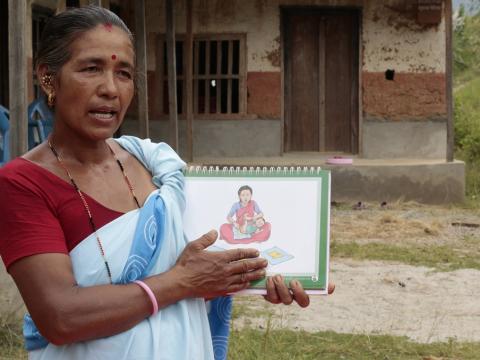
Mental health, ending violence, early child development: We believe child health workers can do more.
By Dan Irvine
The passing of the World Health Assembly resolution on scaling up community health workers (CHW) is a wonderful acknowledgement of the important role they should play in our trajectory towards universal health coverage (UHC).
It builds on the celebrated publication last year of the World Health Organization’s CHW support guidance, as well as the renewed primary health care declaration from Astana. Each of these milestones affirms the opportunity to employ CHWs to increase population coverage of essential health services, and especially to most vulnerable populations. They have also strengthened the global standard for optimizing CHW programme design and management.
As an organization that has supported hundreds of thousands of CHWs over the years, in over 50 countries, World Vision is proud to have contributed to this evolution of CHW guidance and advocacy, and to primary health care science. Looking forward, we are exploring the balances between CHW capacity and the expansive requirements for UHC. Vulnerable population coverage and CHW programme effectiveness and efficiency remain significant challenges.
Additionally, however, we are examining a wider scope of health and well-being issues for which CHWs may play a critical role. These include health determinants that the health system has traditionally struggled to address, such as nutrition, mental health, early child development, and violence. These issues are increasingly prominent in the UHC agenda, but with little identified health system capacity to cope with.
In a series of research implementations with academic partners, World Vision has been consolidating compelling evidence that CHWs can be highly effective in addressing these issues. When we added psychosocial and early stimulation components to our core CHW health and nutrition approach in Palestine, we found extremely positive results for young children and mothers alike across three global standards: the maternal post-natal attachment scale (+13.1%), the UNICEF ECD-KAP test (+21.4%), and the Edinburgh post-natal depression scale for mothers (-21.4%).
Working with the WHO and University of South Wales in Kenya, we found that CHW implementation of the Problem Management Plus intervention for distressed and impaired women with a history of gender-based violence resulted in significantly reduced stress, and improved results compared with the enhanced usual care approach.
Most recently, we conducted interviews with 412 CHWs in four countries, and learned that 74% perceive violence against children to be a serious problem in their communities, 72% believe intervening in this issue to be a part of their role, and 87.4% to already be intervening.
In sum, it seems clear that limitations for leveraging CHWs for a broader UHC agenda are operational, not technical. World Vision believes that with dedicated investment the operational issues can be resolved, opening doors on exciting new impacts for women, children and adolescents.
Learn about World Vision’s Community Health Worker programming here
Dan Irvine is the Senior Director for Health and Nutrition at World Vision International.


